Celebrating 5th Year PCUSA Certified Earth Care Congregations!
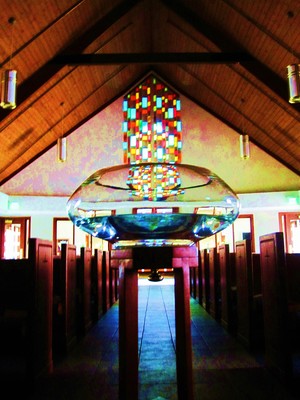
St. Andrews Presbyterian Church (Tucker, GA) font and sanctuary
Nearly a decade ago, individual members at St. Andrews Presbyterian Church separately approached their pastor to share that they had a special passion and concern in caring for God’s creation. The pastor helped these members to come together to form the Caring for Creation efforts at this congregation in Tucker, GA.
When PCUSA was piloting the certification program for Earth Care Congregations in 2010, St. Andrews Presbyterian Church decided to sign up as a way to help them document what they were doing and to plan ahead in a strategic way. While they had been involved in earth care for a number of years, the committee realized they hadn’t been taking any notes in order to either celebrate achievements or set goals for the future.
Three efforts emerged as strong emphases at St. Andrews, based on member’s backgrounds and passions. One focus was aligning the physical building into better environmental stewardship. Using grants from Georgia Interfaith Power and Light (GIPL) and working with the earth care network of the Presbytery of Greater Atlanta, St. Andrews was able to upgrade lighting and insulation and otherwise reduce energy consumption.
When they renovated their sanctuary building, member Susan Phillips was very intentional to reduce, reuse and recycle. The sanctuary renovation was characterized by a deliberate effort to reuse as much material as possible and to use natural products and sustainable products when new materials were needed. As a LEED certified designer Susan reused and refurbished 45% of the existing furniture. Other furniture was donated or bought inexpensively from businesses and recovered. The only wasted furniture was that which the youth had “enjoyed” for too many years. A stone wall from the youth lounge became pillars in the entryway and a punch bowl given as a wedding gift some 50+ years ago was lovingly crafted into a baptismal font. Carpet and tile were resourced within 500 miles and rapidly renewable linoleum was chosen over vinyl tile.
Throughout the buildings members’ art of repurposed materials charmingly and creatively documents the lives of this congregation…ugly ties in the parlor, remnants of clothing in the fellowship hall…gifts of Margaret Williams. Outside, a cherry tree, the beautiful harbinger of spring, had to come down to allow for the renovation. From the trunk artist Earl Meeks created a prayer tree that continues to welcome members and guests to St. Andrews.
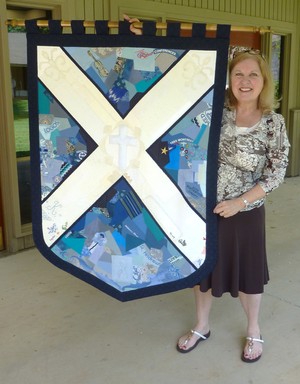
Banner made from cloth donated by many members
A second focus was personal lifestyle choices. What kinds of things do we use in our homes that make a difference? What if we gave up our gasoline powered mower for a push mower? Members led Church School and Wednesday night classes, wrote articles for the newsletter and engaged school children in order to discuss and share ways to incorporate earth care into their homes, schools, work places, and at the church. During Lent, they publish ideas for action and reflection related to earth care and Lenten practice.
A third focus has been food and sustainability, based around the fact that Tucker GA could have been considered a “food desert” area for fresh, local, organic produce, when Caring for Creation started their efforts. The church connected to a Community Support Agriculture (CSA) to bring organic produce to the church, as a drop-off site, for both church members and neighbors. Caring for Creation member Mary Evans explained that in the beginning, around 2006, when they wondered what they could do about food sustainability, they brainstormed about hosting a Farmer’s Market but they knew that they could best sustain a program that was less time intensive for organizers. They decided to try hosting the CSA. Evans described the effort that St. Andrew’s members put into communicating with and settling on the CSA, publicizing the opportunity to area folks, and monitoring the CSA each week (for 30 weeks out of each year). The church hosts the CSA in the church’s kitchen and has been going on now for 7 years. While the CSA only brought one new member into joining the church, the visibility of the church’s service to the community is greatly enhanced.
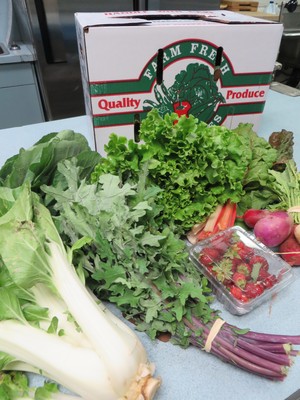
CSA box from Spring 2014 delivery
A newer focus of the sustainable food initiative is a year-round Farm Mobile. Evans says, “the farm repurposed a Mac truck and brings it to the church on Wednesday every week, the same day as the CSA boxes, except they do it throughout the year, and bring grassfed beef and pork, breads, and vegetables. This has worked for families that thought the produce in the boxes was too much.” Both the CSA and the Farm Mobile are a boon to the community, and in the last two years, Farmer’s Markets have started springing up around the community, showing that what the church has started is continuing to grow in interest throughout the neighborhood.
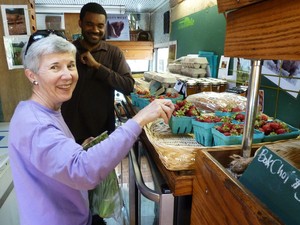
Farm Mobile at St. Andrews Presbyterian
Along with these broader emphases, Caring for Creation offers recycling for St. Andrew members, sells Equal Exchange fair trade coffee, tea and chocolate, and encourages their preschoolers to “think green” in all aspects of trash, recycling, and even growing their own seeds and plants.
With the preschoolers and neighbors alike, St. Andrew also teaches creation care through worm bins! One worm bin lives in a committee member’s guest room and gets shared around for education projects, for the church’s annual carnival, and for the Race for Grace which draws people to the church campus. Race for Grace was made “green” by adding paperless registration, recycling shoes, water bottles and cups, composting food trash, sharing extra food, and including educational components, the worm bin and GIPL educators.
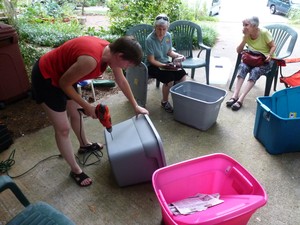
Party to make composting worm bins at St. Andrews
Caring for Creation has ongoing vision for what the future might entail. They hope that efforts will continue to blossom through their congregation and even in this time of interim pastoring, as the church re-examines its mission focus. They’ve been encouraged to think about how their identity as a group of environmentally interested community of worshippers could be a big draw for new members. Evans explains, “We are ‘driving the bus,’ still driving and hoping that with each trip around the block, more people will jump on. We don’t push. We encourage. We connect caring for creation to dollar savings. This has been an opportunity for me to explore, with others, God’s call to creation care.”
When asked for words of wisdom for other congregations interested in getting started, Evans offers, “In Greater Atlanta, talk to Kate McGregor Moseley [a Presbyterian minister who is interim director at Georgia Interfaith Power and Light]!” Knowing that not every congregation might have local experts or the support of community organizations, a Presbyterian seminary in town, or a presbytery earth care network, Evans continues, “I’d say, start it where you can, with the group you have. You have to go with the people you have and their feelings of call. Also, if churches in a presbytery come together and talk about the assets in their community, they might have more strengths and starting points than they realize.”
* * *
There are currently 140 certified PCUSA Earth Care Congregations. For the initial year of certification, each church fills out a congregational audit, gains session approval of an “Earth Care pledge,” and has an earth care team of some sort. This first year of certification often means that a church has been working to integrate care for God’s creation into its ministry for a number of months or years prior to certifying. Each additional year of recertification requires the congregation to both continue and to grow their efforts at integrating creation care into the life of the church. Begun in 2010, this PCUSA certification program has 14 churches now entering their 5th year of certification.
The “5th year certified” churches are: Light Street Presbyterian Church (Baltimore, MD), Trinity Presbyterian Church (East Brunswick, NJ), Bardstown Road Presbyterian Church (Louisville, KY), Church of Reconciliation (Chapel Hill, NC), Montevallo Presbyterian Church (Montevallo, AL), St. Andrews Presbyterian Church (Tucker, GA), Second Presbyterian Church (Little Rock, AR), Maryland Presbyterian Church (Towson, MD), First Presbyterian Church of Howard County (Columbia, MD), North Como Presbyterian Church (Roseville, MN), First Presbyterian Church (Cottage Grove, OR), Swarthmore Presbyterian Church (Swarthmore, PA), St. Andrews Presbyterian Church (Kilmarnock, VA) and Frame Memorial Presbyterian Church (Stevens Point, WI).